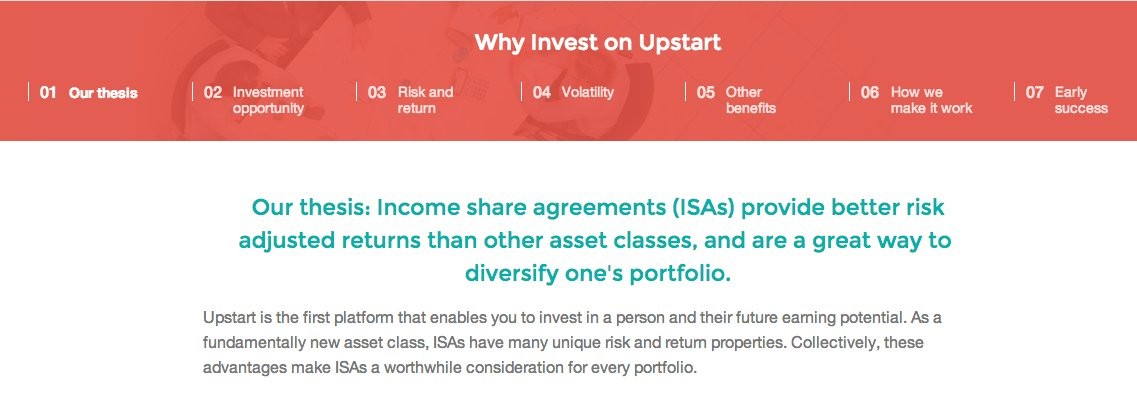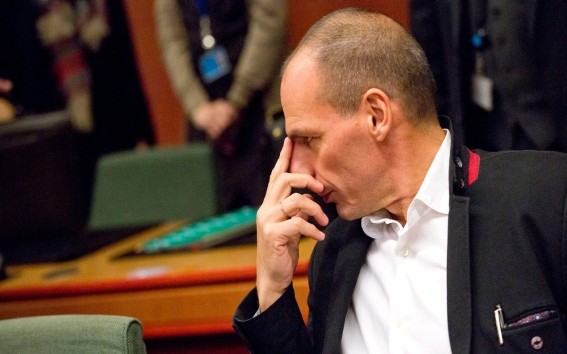Upstart And Pave Investing In Human Capital Business Insider
Post on: 1 Июнь, 2015 No Comment

Mike Nudelman/Business Insider
July 20, 2012, was a big night for Dave Girouard.
It had been four months since he quit his job as head of Google Enterprise to pursue a bold new idea of his own. Now it was coming together. Crowded around a long wooden table with him at the trendy Foreign Cinema restaurant in San Francisco’s Mission District were his small, dedicated team; serial entrepreneur Andy Palmer, one of his enthusiastic investors; and six college students, bright-eyed kids with big plans who just needed a little boost. In front of him sat a stack of yellow envelopes containing a total of $210,000.
The group laughed and talked excitedly over glasses of wine and plates of seafood. It was the first time most of them had met in person, and they were eager to share their stories and dreams for the future. Paul Gu discussed the income-prediction model he was building. Omri Mor explained his work on a music platform.
Around 8 p.m. Girouard tapped his glass and stood. He reminded the table that the young people and the exciting things they were doing were the reasons he had left Google to start this company, Upstart. He thanked the six students there for being the guinea pigs in a totally new venture.
Two or three minutes later he wrapped it up. “We’re counting on you,” he told the students. “Don’t spend it all in one place. And do the right thing — make us proud.”
With that, he passed out the envelopes.
Courtesy/Upstart Dave Girouard, co-founder and CEO of Upstart, prepares to pass out $210,000.
The Dream Machine
The stated goal of Upstart is to connect bright, ambitious young people with wealthy individuals who want to invest in their futures — and, with any luck, help them achieve their dreams. “Upstart was founded to help people do what they were meant to do,” the company announced at its launch in August 2012. “Many talented college grads take jobs they’re not excited about, rather than following their true passions. Whether constrained by debt or just comforted by traditional career options, too many students take the perceived ‘safe path.’”
Upstart, in essence, wants to put a fork in the road.
The venture is one among several attempts by companies to figure out how to give young people with brilliant ideas the financial means to see them through. Across the nation, a generation of would-be entrepreneurs, artists, thinkers, and innovators are being held hostage to student debt, limited credit, and financial instability. Grads with world-changing ideas often wind up abandoning them for the more stable path of a traditional job. In a great socioeconomic irony, the people who may stand to benefit the most from a healthy dose of capital tend to be the least able to obtain it.
“Younger people who are in the early part of their careers are underserved by the financial markets,” says Girouard, Upstart’s co-founder and CEO. “We’re thinking of our mission much more broadly as a huge and important part of our whole economy.”
The pursuit of an audacious dream can lead to great success, but it also demands risk. Upstart aims to spread that risk around through a shrewd model known as a human capital contract. Under these arrangements, borrowers receive funding from investors in exchange for a percentage of their future income over a set period. On Upstart’s platform, the borrowers are known as “upstarts” and the investors are termed “backers.”
What makes human capital contracts unique is that the investment made is not in a particular company or idea, but in a person. After all, supporters argue, companies are no more than the product of the people who create them. So why not simplify the investment process? Why not treat the person as the startup — or, by Girouard’s clever inversion — the upstart?
Upstart and its main competitor, Pave. are harnessing the power of the market to support young people with the energy, ambition, and creativity to make a genuine mark in their chosen fields of endeavor. Rather than appealing to donors’ charitable instincts — like Kickstarter. Indiegogo. and other crowdfunding sites — they are trying to create a scalable marketplace that can transfer capital from wealthy people who have it to innovative people who need it, utilizing big data and new algorithms that aim to quantify a candidate’s future potential.
“We’ve always been about democratizing access to funding and knowledge,” says Oren Bass, one of Pave’s co-founders. “You have people who are young, energetic, full of aspirations and energy and hope, yet they lack a suitable funding option that lets them go after these careers and these dreams of their choosing.”
One of those people is Andrew Galasetti, a self-published author and aspiring writer. Galasetti, 25, grew up in a poor household with his mother, a struggling artist, and an older sister after his father abandoned the family. Galasetti inherited his mother’s creative spark but struggled with a learning disability. Despite that, he nurtured ambitious plans for his future. In 2012, he graduated from Georgian Court University, a small Catholic school in New Jersey, with a bachelor’s in English, big dreams, and years of student loans to repay.

In December 2013, Galasetti turned to Upstart. Over the next two months, he aimed to raise $25,000 from backers to promote and publish an upcoming novel, establish a publishing company, and solidify his career as a writer. On his blog, he called it “A leap of faith with Upstart. ”
“What if everyone could pursue their passions, purpose, and fulfill their dreams? Wouldn’t this country and the world be a better place?” Galasetti wrote on Dec. 7. “Upstart is trying to tackle these big questions. They may very well be the leap of faith into the right direction to make this a reality for more people. This is something special that I need to be a part of.”
The exact percentage of future income that each upstart, or Talent, as Pave calls them, gives up is determined by an elaborate funding algorithm each company has created to predict an applicant’s earning potential. The models take into account a set of data points that includes education, standardized test scores, credit history, and job offers. The contracts themselves can be either five or 10 years in duration. In years where the borrower’s earnings fall below a certain threshold, no payments are made. Upstart defers them and tacks up to five additional years onto the contract, while Pave counts these years in the participation period unless the Talent is enrolled in a full-time academic or training program. Upstarts can give up no more than 7% of their future income, and Talents no more than 10%.
Backers on both platforms are required to be SEC-accredited investors, which for individuals means they have either a minimum net worth of $1 million or earn more than $200,000 per year. Upstart targets an 8% return for them and Pave a 7% one, but backers can see an upside of up to five times their initial investment should their picks achieve great success. The backers have no control over how upstarts and Talents use the funds they raise, though they are encouraged to provide mentoring and advice.
For their part, Upstart and Pave make money by taking a cut of the funding exchange. Upstart collects 3% of what students raise up front and charges an annual 0.5% on investments to backers. Pave takes 3% off what Talents raise and then 1.5% of each repayment.
Pave Filmmaker Clara Aranovich raised $50,000 from 15 backers on Pave.
To the borrowers, high-flying dreamers like Galasetti, Upstart and Pave are selling a kind of freedom. For the backers, these platforms offer a feel-good investment option — the chance to support a new generation while realizing a decent return. And the unspoken implication is that the next Mark Zuckerberg could be hiding somewhere in the unsponsored pool. Back an upstart or a Talent, and you just might bottle lightning.
For this novel funding approach to take off, Upstart and Pave have made the lofty bet that they can take a generation of unpredictable young people — people with little or no work experience or credit history — and turn them into something highly predictable, a human asset class that even the most risk-averse investors will consider a smart place to put their money.
But the higher stakes are being played out on the other side of the equation by the upstarts and Talents. They will be the ultimate measure of whether these companies can truly democratize access to capital.
“It’s actually going to have a big effect on the socioeconomic makeup of America if we’re successful,” Bass says. “It’s a huge leveling of the playing field.”














